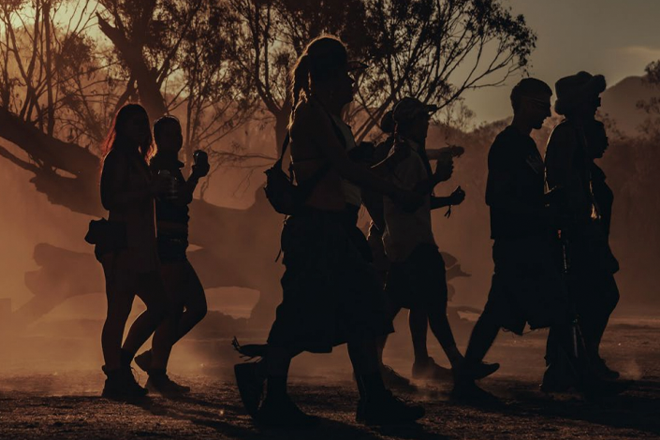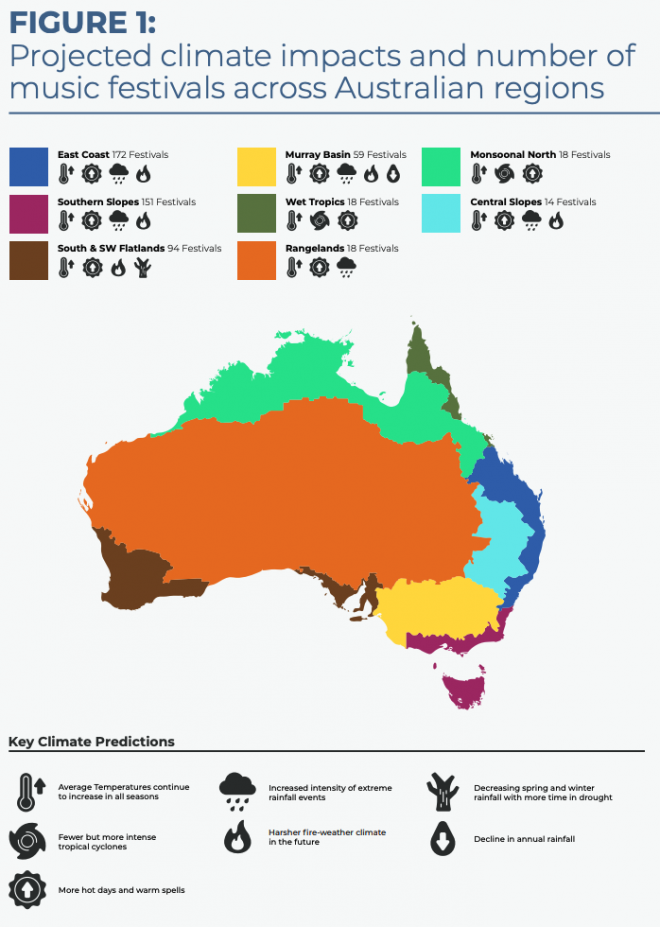Australian music festivals could fall to the climate crisis, a new report warns
The report, coordinated by Green Music, RMIT University and La Trobe University, claims that extreme weather is already changing the way fans experience and attend live music events.

"Music festivals are a threatened species that could die out if they fail to adapt to the climate crisis," alleges The Guardian in an article it shared yesterday.
Rain, Heat, Repeat: How Music Fans are Experiencing Extreme Weather is a report released on Wednesday of this week, coordinated by Green Music Australia, and with analysis by RMIT and La Trobe University.
With stories of cancellation and postponement impacting some of the country's largest festivals, including Pitch Music & Arts cancelling mid-event due to fire danger just last year, and Splendour In The Grass' 2023 edition still a highly muddy and publicised memory, Australia's festival industry is one consistently tied to its weather.
This report brings that consensus into real figures however, with a sample of 1,155 music festival attendees over Victoria, New South Wales, Queensland and Tasmania.
Some of the report's key findings include that:
- 85% of festival-goers have experienced what they consider to be extreme weather in the last 12 months.
- Two thirds (68%) have experienced extreme heat at a music festival in the last 12 months.
- An average of 45% have experienced heavy rain at festivals over the same period.
- More than one in ten (17%) have experienced flood impacts at festivals in the last year.
- 88% of respondents believe climate change contributes to increased extreme weather at Australian music festivals.
- 81% think that governments aren't doing enough to protect the music scene from climate impacts.
- 33% would avoid attending a festival if the forecast was over 35 degrees, with 66% avoiding festivals at 40 degrees, and 84% at 45 degrees.
- 34% of average festival goers are cautious about purchasing tickets due to extreme weather, with 44% of those attending gigs weekly sharing the same sentiment.
- 29% actively check the weather before purchasing tickets.
- 17% of respondents now purchase ticket insurance due to extreme weather concerns.

To put these statistics into perspective, Catherine Strong, sociologist and associate professor at RMIT, shared her analysis and recommendation of the report's findings.
“The normal way the festival industry does business relies on a certain number of tickets to be sold early and often,” Strong said.
“People are now getting cautious enough about the weather that they’re starting to leave their ticket buying to the point where they can meaningfully look at a weather forecast, and this in turn affects how festivals can assess whether or not they are viable … and for a lot of them, that’s just not practical. A late cancellation means having to pay artists more for their cancellation fees, and it drives insurance costs up even more.”
“The sustainability of Australian musicians being able to make a career out of what they do is definitely being threatened by these trends,” Strong continued.
Outside of rising operational costs, including venue rent, supply costs, insurance premiums and transportation costs, the impact of extreme weather will, according to the report, become impossible for festivals to address and governments to ignore.
A recent Federal Government inquiry into the Australian live music industry "highlighted significant challenges but failed to meaningfully address climate change," the report shares.
"Of its 20 recommendations, only one indirectly mentions the issue, calling for permanent, weather-resilient festival sites in regional areas. This response falls short of what is needed. To protect Australia’s vibrant music culture, action must go beyond adaptation and tackle the climate crisis at its source. Notably, only Victoria and Western Australia have included climate action within their arts and culture strategic plans. Other states—and crucially, the Federal Government’s national arts strategy, Revive—make no mention of climate change, leaving a critical gap in arts policy."
The report's recommendations are unsurprising to those attending and organising events.
These include:
- The need for governments to act on climate science.
- Elevation of First Nations leadership in climate solutions.
- Strengthening of government action to protect live music.
- Improvement of transparency and risk communication for audiences.
- Investment in sustainable infrastructure and climate-safe event design.
- Introduction of consumer protections for ticketholders.
- Prioritisation of research and sector-wide collaboration.
With the extended summer festival season having now finally come to a close, the risk of extreme heat would appear to no longer be a concern. Australia's flagship Winter festival, Splendour In The Grass, will not be going ahead in 2025.
With room to breathe available, only time will tell if the report's findings and recommendations are taken on board for the looming summer 2025 season.
To close, the report urged readers to take action.
"The time for action is now. Without stronger climate commitments, the future of Australia’s music festivals—and the communities they bring together—remains at risk," it reads.
-
Jack Colquhoun is Mixmag ANZ's Editor, find him on Instagram.


